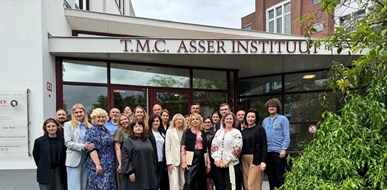Towards a more just future: Transitional justice course for Ukrainian civil servants
Published 18 December 2024
May 2024 - Ukrainian government officials that completed a Training of Trainers (ToT) workshop on transitional justice in The Hague.
To help address the complex challenges arising from the Russia-Ukraine war, the Asser Institute, UpRights, and the Hague Academy for Local Governance have developed a training programme to enhance Ukranian officials’ understanding of transitional justice issues, such as reparations, reconciliation, and the restoration of public services. In 2024, close to a hundred Ukrainian civil servants received a specialised training, and are now leading training initiatives for hundreds of their colleagues. Building on the strong engagement and positive outcomes, the partners plan to extend the reach of the programme in 2025.
The transitional justice programme was developed in partnership with the Ukrainian High School of Public Governance and is based on a needs assessment conducted with Ukrainian government officials, civil society representatives, international experts and academics. The assessment found that while criminal accountability is often the primary focus of government actors, they need support to address other transitional justice challenges, such as reparations, reconciliation, restoration of public services, mistrust in returning authorities and the conditions of victims and internally displaced persons.
Since September 2024, close to a hundred Ukrainian civil servants have completed the online training on transitional justice. Ukrainian government officials, including some of whom attended a ‘Training of Trainers’ programme in The Hague, have further organised live workshops for hundreds of their colleagues. These workshops, which took place in Kyiv and in de-occupied communities in the Kherson and Kharkiv regions, focused on topics such as support to victims and internally displaced people, compensation for damages, approaches to preventing and addressing conflict-related sexual violence, and memorialisation and documentation of the ongoing conflict.
Increased cooperation
According to the course’s participants, the creation and implementation of the online course has significantly increased cooperation between Ukrainian government sectors, enabling them to integrate transitional justice principles and practices into their daily work. As noted by a government partner: “There is a need for international cooperation that would allow us to reach all concerned groups, from high level officials to any other role in civil society institutions.”
Encouraged by the strong engagement and positive outcomes, the Asser Institute, UpRights, and the Hague Academy for Local Governance intend to expand the programme in 2025. This will involve additional workshops and a new online module, developed in consultation with Ukrainian officials to address evolving needs and build on existing training. Describing their hopes for the future, a participant stated: “We understand that the practical implementation of this training course will help improve the situation in our country. Each of the participants has their own experience which is of utmost importance to overcome the conflict in Ukraine and guarantee that similar situations do not take place anywhere else in the world.”
About this project
This project is part of the ‘Restoring Dignity and Justice in Ukraine' consortium programme, which focuses on advancing accountability for international crimes committed in Ukraine. The project aims at institutional strengthening and capacity development needs of the key parties in Ukraine dealing with international crimes, such as prosecutors, police, judges, as well as journalists and civil society organisations. The programme is funded by the Dutch Ministry of Foreign Affairs and is implemented by the International Development Law Organisation (IDLO), in partnership with the T.M.C. Asser Instituut, the Center for International Legal Cooperation (CILC), and the Netherlands Helsinki Committee (NHC).
Read more
Restoring dignity and justice in Ukraine: Expertise and mechanisms
Despite numerous international and regional mechanisms to ensure accountability for conflict-related crimes in Ukraine, domestic efforts shoulder most of the burden and must be supported. This project aims to advance accountability for international crimes in Ukraine by strengthening expertise on accountability mechanisms and contextualising accountability processes. Read more.

